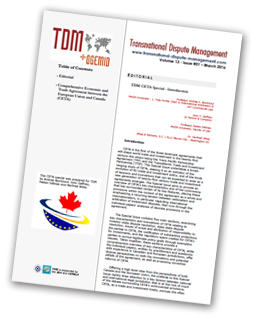News
19 January 2022: Brierley Memorial Lecture
 We are pleased to announce that the 2022 John E.C. Brierley Memorial Lecture will be given by Professor Giuditta Cordero-Moss, Faculty of Law, University of Oslo.
We are pleased to announce that the 2022 John E.C. Brierley Memorial Lecture will be given by Professor Giuditta Cordero-Moss, Faculty of Law, University of Oslo.
Her conference is titled "Towards the end of arbitrability? About Achmea, Komstroy, PL Holdings, et al." An arbitrator, Professor Cordero-Moss is a member of the ICC Court of Arbitration and of the Curatorium of the Hague Academy of International Law. She was also President (2017-20) and Judge (2007-2020) of the European Bank for Reconstruction and Development Administrative Tribunal.
Kindly RSVP with your full name and affiliation to pjrl.law [at] mcgill.ca. Connection details will be provided by email closer to the event.
11 June 2021: Professor Fabien Gélinas receives 2021 David Thomson Award for Graduate Supervision and Teaching
 Professor Fabien Gélinas has received the 2021 David Thomson Award for Graduate Supervision and Teaching, which was presented to him by Professor Andrea Bjorklund, associate dean (graduate studies) during the Faculty of Law's Spring Convocation ceremonies on 11 June 2021.
Professor Fabien Gélinas has received the 2021 David Thomson Award for Graduate Supervision and Teaching, which was presented to him by Professor Andrea Bjorklund, associate dean (graduate studies) during the Faculty of Law's Spring Convocation ceremonies on 11 June 2021.
The David Thomson Award acknowledges outstanding contributions to the promotion of graduate student excellence through supervision and teaching by a faculty member who has been supervising students for 10 years or more. In selecting Professor Gélinas, the committee highlighted his individualized approach to graduate student mentorship, his substantial supervisory load, and his strong record of publishing with his students. Read the announcement.
 2 October 2019: Continuity and Change in the ICSID System: Challenges and Opportunities in the Search for Consensus
2 October 2019: Continuity and Change in the ICSID System: Challenges and Opportunities in the Search for Consensus
The Private Justice and the Rule of Law Research Group hosted the 2019 John E.C. Brierley Memorial Lecture, which was given by Meg Kinnear, Secretary-General of the International Centre for Settlement of Investment Disputes (ICSID).
Find out more and watch her conference.
 21 November 2018: Special Purpose Tribunals: A Road to Take?
21 November 2018: Special Purpose Tribunals: A Road to Take?
17:30-19h, Maxwell Cohen Moot Court (NCDH 100)
The Private Justice and the Rule of Law Research Group (PJRL) welcomed Professor Hans van Houtte for its 2018 John E. C. Brierley Memorial Lecture.
Professor Van Houtte was introduced by L. Yves Fortier, and Stephen Drymer gave the closing remarks.
The lecture was followed by a cocktail generously sponsored by Woods LLP.
 14 March 2018: Limites et potentiels des modes mixtes de règlement des différends
14 March 2018: Limites et potentiels des modes mixtes de règlement des différends
11:30-13:00, NCDH 102
The Private Justice and the Rule of Law research group was pleased to welcome Professor Véronique Fraser (Université de Sherbrooke) for a talk on mixed modes of dispute settlement.
The presentation was moderated by Professor Marie-Claude Rigaud (Université de Montréal).
 12 September 2017: International Dispute Resolution Courts: Retreat or Advance?
12 September 2017: International Dispute Resolution Courts: Retreat or Advance?
The Private Justice and the Rule of Law research team, with the support of the John E.C. Brierley Memorial Lecture Fund established by Yves Fortier, and the L. Yves Fortier Chair welcomed Professor Lucy Reed, Director of the Centre for International Law at the National University of Singapore.
Find out more and watch her conference.
 21 February 2017: King Rex v. Judge Judex: Adjudicating Transnational Law
21 February 2017: King Rex v. Judge Judex: Adjudicating Transnational Law
Professeur Fabien Gélinas, who heads the Private Justice and the Rule of Law research group, gave his inaugural conference as new holder of the Sir William C. Macdonald Chair. To find out more...
Recent publications
Team members Fabien Gélinas and Andrea Bjorklund edit a special issue on CETA
 We are happy to announce the publication of Comprehensive Economic and Trade Agreement between the European Union and Canada (CETA), a special issue for Transnational Dispute Management.
We are happy to announce the publication of Comprehensive Economic and Trade Agreement between the European Union and Canada (CETA), a special issue for Transnational Dispute Management.
Edited by Professor Andrea K. Bjorklund (McGill), J.P. Gaffney (Al Tamimi & Co.), Professor Fabien Gélinas (McGill), and H. Wöss, (Wöss & Partners) and opening with prefaces by Professor Pieter Jan Kuijper (UvA) and the Hon. L. Yves Fortier, the special edition features 15 articles by noted scholars and practionners.
From the introduction:
"...This Special Issue undertakes a broad-ranging study of CETA, viewing it as an indicator of the evolution of EU trade and investment policy, and of the kinds of tensions and innovations that can be expected to arise as a new generation of twenty-first century trade and investment agreements emerges. The Special Issue aims to provide an overview of CETA's key characteristics and of the controversy that has surrounded certain of its key features, placing these provisions within the context of the agreement as a whole and emphasizing a recurring tension between nationalism and internationalism, in particular regarding international arbitration of investment disputes, that runs through the individual papers' analyses of discrete provisions in the agreement..."
Find out more at www.transnational-dispute-management.com/journal-browse-issues-toc.asp?key=65
Fabien Gélinas edits new collection: Trade Usages and Implied Terms in the Age of Arbitration
If a dispute between commercial parties reaches the stage of arbitration, the cause is usually ambiguous contract terms. The arbitrator often resolves the dispute by applying trade usages, either to interpret the ambiguous terms or to determine what the given contract's terms really are. This recourse to trade usages does not create many problems on the domestic level. However, international arbitrations are far more complex and confusing.
- Contains clearly organized chapters providing in-depth information about the treatment of usages in cases and doctrine in different countries
- Explores possible conceptual frameworks to help shape the emerging transnational law of trade usage
- Outlines what the conceptual grounding of trade usages could be in the transnational law of commercial contracts
- Offers a clear overview of interpretive tools for approaching and comparing CISG and UNIDROIT principles as they relate to usages
- Provides a comprehensive summary of relevant legislation on international treatment of trade usages for reference and comparison at a glance
- Clearly organized chapters providing in-depth information about the treatment of usages in cases and doctrine in different countries
- Offers a chapter on cataloging and analyzing all ICC arbitral awards referring to trade usages
Find out more at oup.com/.../trade-usages-and-implied-terms-in-the-age-of-arbitration...
Armand de Mestral leads investor state arbitration project at CIGI

On June 9, 2015, the Centre for International Governance Innovation (CIGI), through its International Law Research Program, has launched a new project aimed at studying an emerging policy issue in the world of contemporary international investment protection law: should a corporation from one developed democracy have the legal right to sue the government of another developed democracy? In other words, is investor state arbitration (ISA) suitable between developed democratic countries?
“There is a growing unease with the established investor state arbitration model as it applies between developed democracies, but there is as yet no consensus on whether a solution exists,” says Armand de Mestral, CIGI senior fellow and lead on CIGI’s investor state arbitration project. “This study will examine the controversy as it is currently manifesting itself in developed democracies, with a view to determining what courses of action might be available to concerned countries.”
Read CIGI's press release and the related media backgrounder.
In September 2015, De Mestral presided a conference with CIGI titled "Investor State Arbitration Between Developed Democracies: A Policy under Challenge." (see the program [.docx] or visit the website), where he presented the first paper in the new CIGI Investor-State Arbitration Series, "Investor-State Arbitration Between Developed Democratic Countries" [.pdf].
Keep in touch
Sign up for the PJRL mailing list!
Arbitration and beyond
As a form of private justice supported by the power of the state, arbitration is subject to the control of a court of law. Of its own motion, the court ensures that the matter is arbitrable and that public policy has been respected. At the request of a party, the court is also responsible for ensuring compliance with the agreement between the parties, including issues related to the competence of the arbitrator.
Arbitrability, public policy, arbitration agreements and competence lie at the heart of the dynamic between private justice and public justice, as they determine for the latter what remains an area reserved to the state, free from competition. This area has become the focus of attention because of the increasing recognition of the right of the parties to determine their own law, which can entail the application of rules taken outside the parameters set by recognized legal systems. For example, these rules can refer the arbitrator to religious law or to rules of transnational commercial law.
At McGill, our research team is currently asking the hard questions about the relation between private justice and the rule of law.

